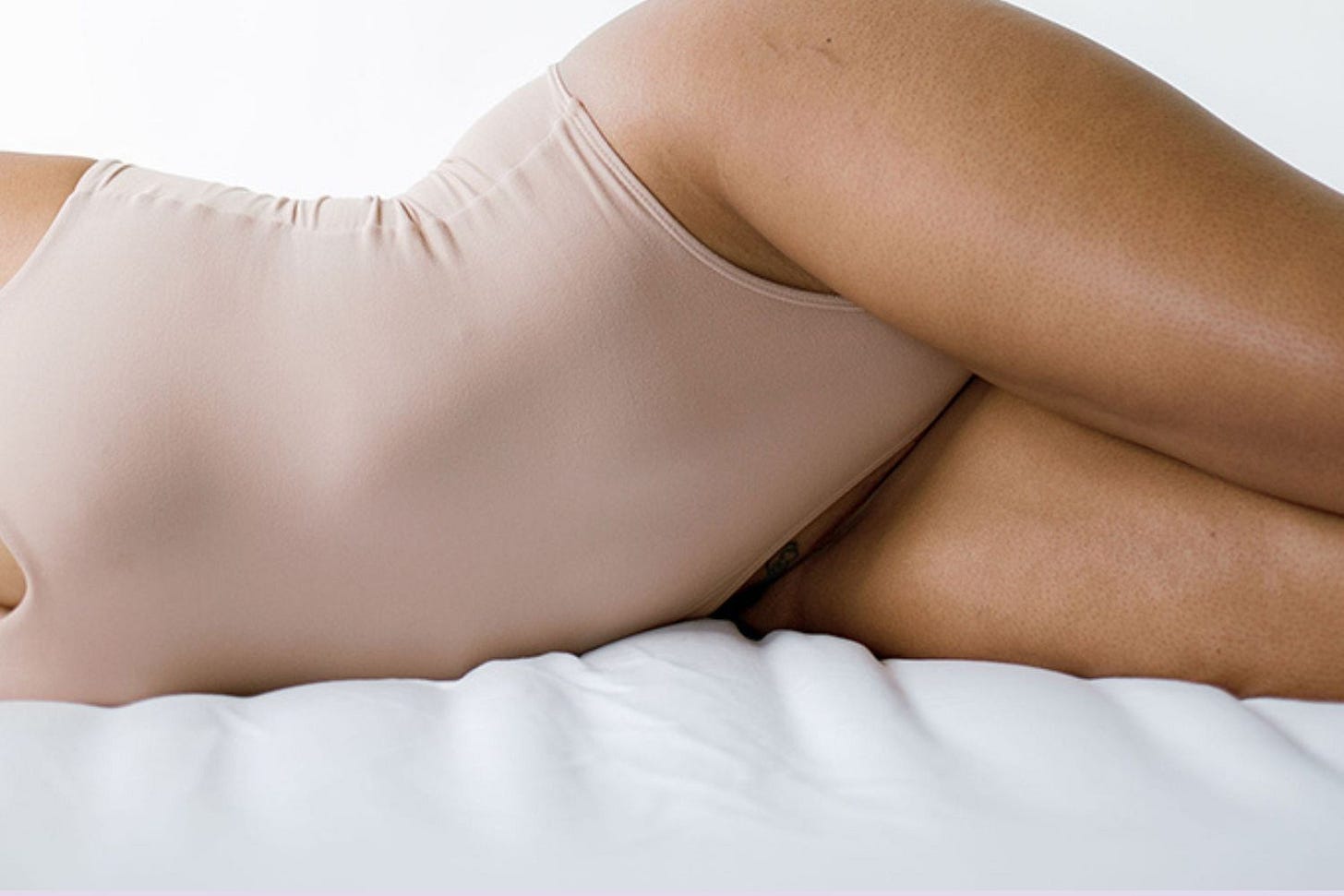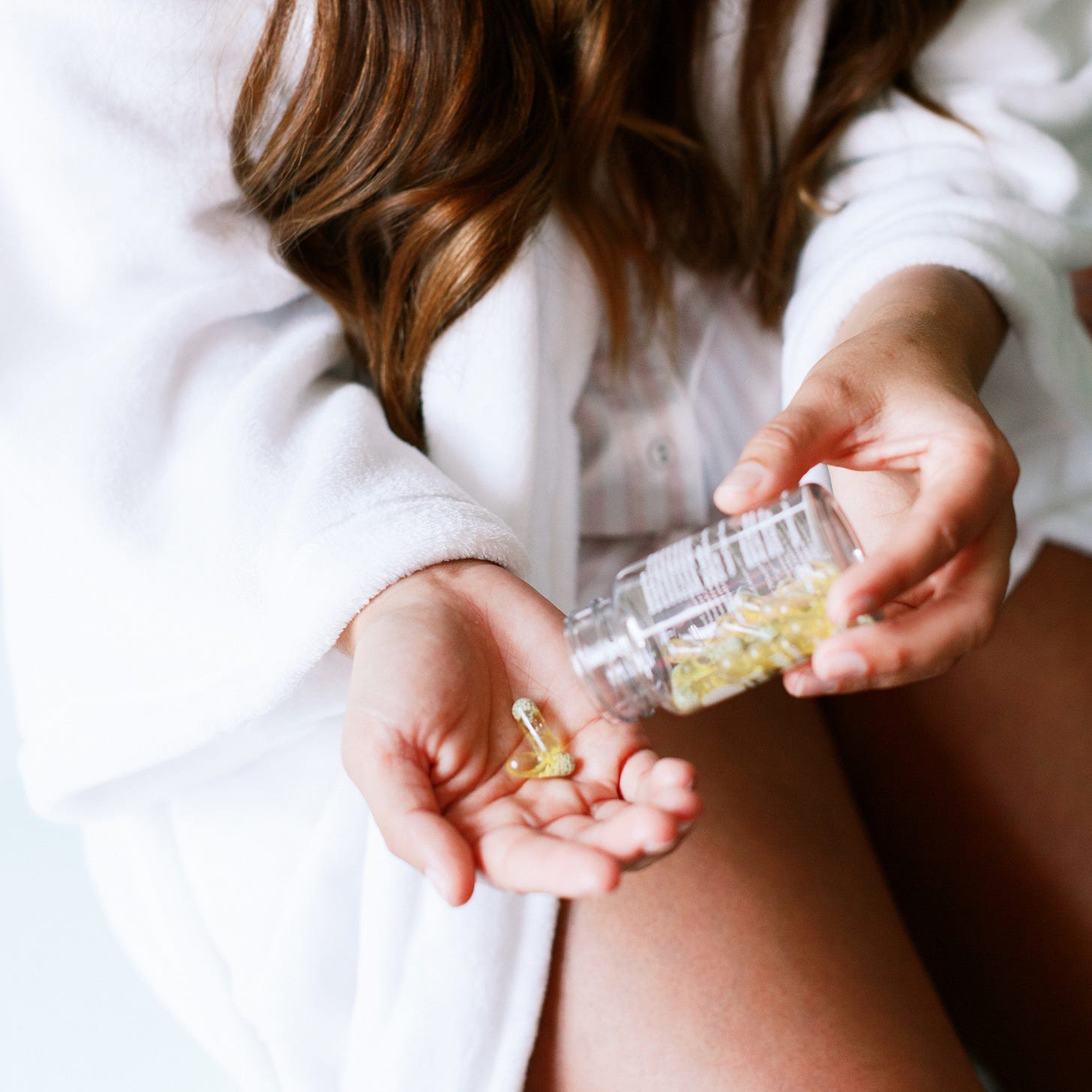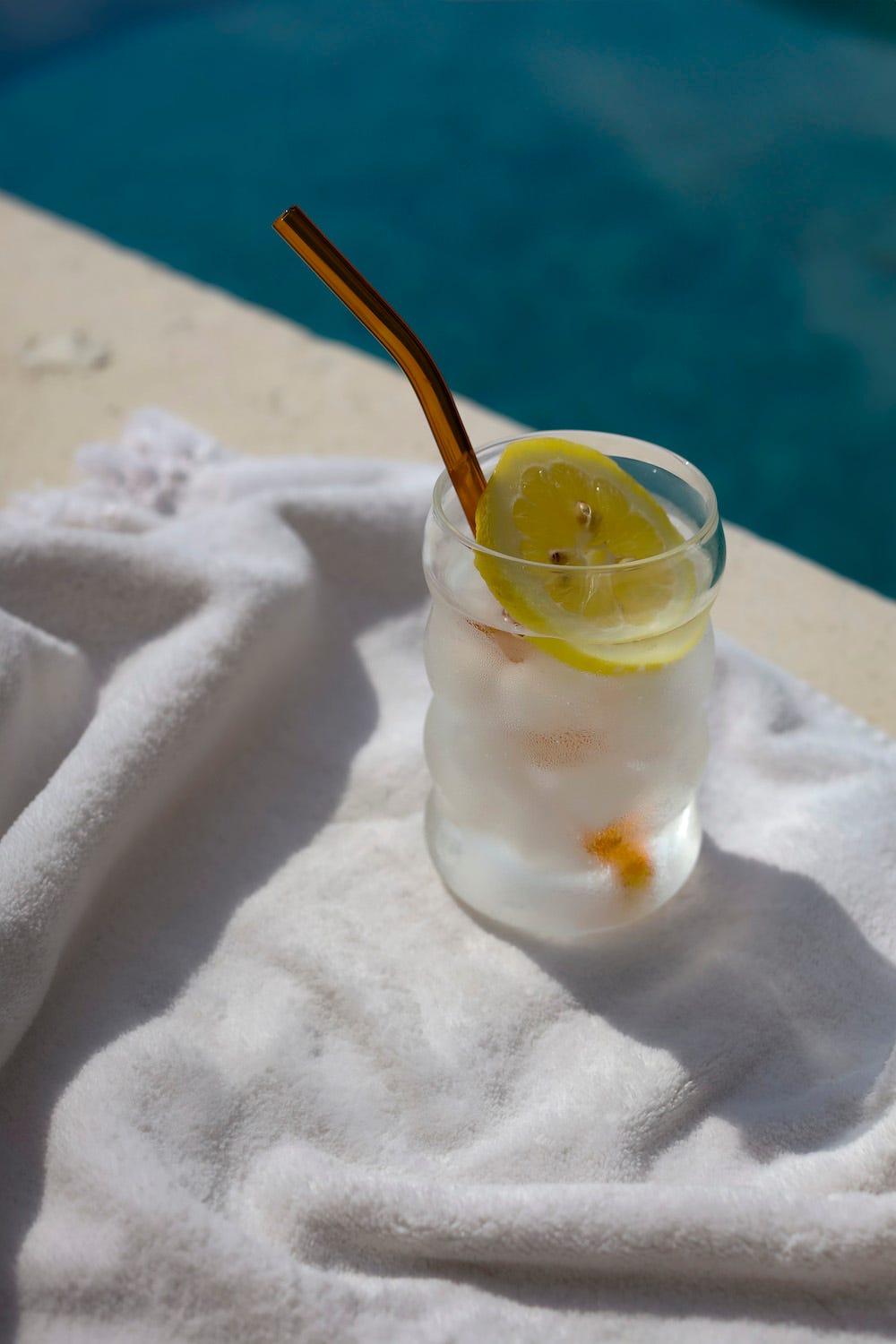Meno-rexia: Why women in peri/menopause are developing eating disorders
The IRONY: How your meds could make you SICK in the summer
BeWell | The Midst beauty, style & wellness newsletter
Exclusive for subscribers to The Midst Substack
“You can buy them in bulk, honey.” The lady behind the Dairy Queen counter pointed to the premade ice cream sandwiches in the fridge. Oh, my god. Did she know that I puked them up, too?
I was an unsuccessful bulimic — my binges surpassed my purges — and I was overweight, having gained 30 pounds since I started college the year prior. The trauma from date rape (is the passive modifier “date” still used these days?) left my 19-year-old mind seeking control over my body. Food was an obvious choice to spike my dopamine and reclaim my power — although it took me years to realize that’s what I was doing.
I can’t remember the details of this time in my life with clarity, but my writing helps memories resurface — and I am reminded of how I could “see” again after the Dairy Queen herself shamed me to seek out Overeaters Anonymous (OA) meetings. (Despite its name, OA helps people recover from eating disorders like anorexia, bulimia, and of course, compulsive overeating.) It was as if a veil fell from my eyes — I saw the sky and the colors in the flowers: I wasn’t (as) consumed with food and weight and secrets and control.
What people don’t know — often including people suffering — is that eating disorders are a disease of the mind: An eating disorder is a serious, complex, mental health issue that affects someone’s emotional and physical health. And like being an alcoholic in recovery, being a bulimic in recovery is very much the same — there are triggers and maintenance, and it never really goes away.
When everyone and her sister (search “semaglutide” on TikTok to see for yourself) started taking Ozempic-like drugs for weight loss, those icky feelings of shame and control resurfaced — big time. Why do I feel this way again? I thought I was done with this bullshit.
Cue Australian writer Kerry Martin Millan who emailed me her pitch about the concerning trend of peri/menopausal-aged women (re)developing eating disorders. The timing couldn’t be more perfect personally, and like much of the stuff we MidstHers experience, if I felt this way — and if Kerry felt this way — likely you or another reader is going through it, too.
Find Kerry’s captivating piece below, and please know that if you’re in this headspace, too, you’re NOT alone.
Meno-rexia: The alarming trend of eating disorders during peri/menopause
I always thought I was well past my adolescent eating disorder. But at 47, I started dieting intensely. Now I realise what might be prompting my preoccupation with calories and fat at this age.
Too old for eating disorders?
I found myself looking in the mirror again at 47, worrying about the changes in my physical appearance — the lines on my forehead, the weight that had accrued on my hips. Concerns about the perceived blandness of my physical features rose up within me like a tidal wave. Yet, I had forgotten about this stuff long ago. I immediately cast it off as a fluttering awareness of older age. I told myself to perk up and to stop the adolescent fantasy. I’m still on a diet, though, wondering why I care so much.
According to research, my fears aren’t just adolescent fantasies. As per the recovery blog, Eating Disorder Hope, a growing trend of older women, largely between 40 and 50 years old, at around 1 in 28 in the U.S., actively have eating disorders. The recovery centre also goes on to say that according to Kansas University research, 20% of middle-aged women in the U.S. possess body dissatisfaction.
Emmett R. Bishop, MD, a founding partner and medical director of adult services at the Eating Recovery Center in Denver, expounds on the obvious reasons for eating disorders at this age: bodily changes beset by hormonal fluctuations, weight gain, and changes in all over physical features that ensue feelings of a loss of control.
I’ve always thought that because my eating disorder was eons ago, I’m now immune. I was 13, with severe anorexia, weighing an unbelievable 35 kilograms at 167 centimetres [about 77 lb. at 5’6”]. But I’m wrong. Statistics say that I’m more likely to develop an eating disorder in middle age because I once had a teen eating disorder.
A global obsession with age could be responsible for midlife eating disorders
I also can’t help to think that the catalyst for eating disorders in midlife is much deeper than weight. This time, I’m right. Women are also living in a time of weaponized language about age — to add, in a global context. Anti-aging rhetoric is no more prevalent than in the world of cosmetics and celebrity. Converted in the mind of the anorexic, where loss of control shapes their response, even anti-aging is brutally persuasive.
“Reducing visible aging and fine lines,” chants a L’Oreal ad for anti-aging cream. “Age-proof,” “age-defying,” and many anti-aging epithets describe the ways in which women are obliged to fend off the inevitable. Even the very word “concealer,” used to describe the job of foundation, is about “hiding” flaws and “concealing” ugliness.
If it’s not Andie MacDowell’s grey hair that’s problematic, it’s Meg Ryan’s alleged gaudy cosmetic surgery or Sarah Jessica Parker’s marked aging process. In truthful defiance, she retorts in US Magazine, “I have no choice. What am I going to do about it? Stop aging?”
It goes even further for Jessica Parker, who was touted the “No. 1 Unsexiest Woman Alive” by Maxim magazine. She is reputed as saying the poll was “brutal” and it even affected her husband Matthew Broderick.
But it’s the message to others that’s shattering, that says unattainable beauty leaves you open to social vigilance and vitriol. Although that comment could be politically motivated, perhaps where another didn’t get a movie part or Jessica Parker riled someone in some way. Who knows?
The power of pro-aging stances
Sure, you shouldn’t be listening to the antics of industries making money by leveraging the insecurities of vulnerable demographics. But still, these messages are impactful. Even Jamie Lee Curtis – a veteran A-lister with parentage and credentials to die for – has said a thing or two to counter anti-aging culture. Declares Lee Curtis in a 2022 interview with Shape Magazine:
“This word ‘anti-aging’ has to be struck. I am pro-aging. I want to age with intelligence and grace and dignity and verve and energy.”
Whether depicting overtly demeaning images of celebrities, or even the binary opposite — youthful maturity — age and beauty is still a fixation. In fact, idolizing those conforming to prescribed beauty standards is part of the problem. Again, if it’s not Helen Mirren’s defiance of age that’s so revolutionary — most likely genetic luck and income to spend on looks — it’s how amazing a string of other celebrities look for their age. But the comparison is unfair. Under hot lights, disguised by makeup with a six-digit income, enormous gulfs become obviously apparent. Naturally beautiful is rarely a non-contrived commodity.
The lesser-known realities of eating disorders
Coming back to the psychology behind anorexia, other more pressing concerns also agitate perhaps a pending trajectory. UHH Hospital article,”Eating Disorders: A Growing Concern for Women in Midlife,” confirms this, outlining how “stressful life events” can trigger eating disorders. Women of middle age may have faced divorce, custody battles, the legacy of old relationships, the brunt of infidelity, child-rearing and parenting concerns, career trajectories and disappointments, and even fears of mortality, especially when parents have passed away. Deeper eating disorder psychology is as much about all-over control as it is about all-over beauty.
Eating disorders are also incredibly unhealthy in unapparent ways. Fending off starvation and maintaining homeostasis by clinging to fats, anorexia induces high cholesterol. You’re more vulnerable to disease with a lowered immune system in starvation mode, and some sufferers have died of heart failure. Despite the glorification of thinness, it’s a devastating mental illness that kills you. The UHH Hospital blog lists many more concerning complications such as diabetes, pancreatitis, and bone density loss due to malnutrition.
Due to the age bracket, the blog also states that women of this age band are less likely to bounce back. Weight and body image have also become a precipitating factor in illicit drug use, where some women have actually died from drug overdoses.
I remember back
I see my fragile, thin arms reaching up to the clothesline to peg the linen on. My hair was brittle and my face looked older than anyone I knew. I had scabs and sores on my legs from where I’d been horse riding, where holding the reins on my steed, who could sense something was up, was akin to lifting a tonne. I think I’ll step away from the mirror now, be as healthy as I can, and count my blessings because I’m not sure it’s a road I want to be on.
This piece was originally published this week here on The-Midst.com.
Why your medication could make you sicker during the heat wave
By Anne Holub
Summer is still heating up (even though spooky season supplies are in the stores already) and if you’re like most of the U.S. right now, you’re bracing for another heat wave next week. While you may be thinking of cold margaritas and hanging out by the pool, your concern might need to be focused on your medicine cabinet.
What many of us don’t realize is some of our everyday medications, whether prescription or over-the-counter (OTC) drugs, can actually make it harder to withstand heat waves. And that could have dangerous consequences.
What happens to your body in a heat wave?
The World Health Organization notes that “heat stress is the leading cause of weather-related deaths and can exacerbate underlying illnesses including cardiovascular disease, diabetes, mental health, asthma, and can increase the risk of accidents and transmission of some infectious diseases.” Even without problematic medications, when our bodies are under heat stress for prolonged periods, it’s harder and harder to cool ourselves down. While our bodies fight to cool internal temps, it takes resources away from other organs, like our kidneys or heart. The longer this struggle takes place (the longer the heatwave lasts), the closer our bodies get to heat exhaustion, worsening chronic conditions, or even acute kidney injury.
Learn the signs of heat-related illnesses, including sweating (or suddenly NOT sweating), fainting, dizziness, and more.
Medications that increase your heat risk
Many common OTC medications can make your body more vulnerable to heat-related illnesses, especially during heat waves when your body may already be struggling to cool you down. They include:
Aspirin and other painkillers that can decrease fluid and sodium levels, making it harder to cool down.
Antihistamines like Benadryl, can make you sweat less and can impair internal temperature regulation.
Diuretics can make your body remove excess fluid, which can be your doctor’s aim, but also can make it harder to cool down and can lead to dehydration.
Acne medication and other skin treatments like Retinol, antibiotics, or antifungals can make your skin super sensitive to the sun, meaning you could get sunburn or rashes faster.
Prescription medications — some of them quite common — also can make it harder for you to cool down, including:
ADHD medication, including stimulants, can make your body’s internal temperature run hotter, by interacting with your central nervous system.
Anti-depressants can increase sweating and decrease your sense of thirst, so it’s important to hydrate even when you don’t “feel” thirsty.
Beta-blockers for treating high blood pressure can make it harder to sweat.
Blood pressure medications, including ACE inhibitors, can increase the chance of fainting and can inhibit sweating.
Anti-psychotic medications, some used for treating illnesses ranging from schizophrenia, bipolar disorder, depression, and Alzheimer’s disease, can make it harder to sweat and cool down.
How to stay safe (and on your meds) in the heat
You definitely don’t want to just stop prescribed medications willy-nilly — but you do want to be aware of how medications treat your body. Your doctor prescribed those pills because they want you to be awesome. But you are allowed to ask them for help, too.
If you think that one or more of your medications might also make it harder to fight off a heat wave, give your doctor a quick email or message. Ask for their advice, given the hot weather.
Talk to your pharmacist, and check the information about your Rx or OTC medication. If you already threw out that weird pamphlet that came with your refill, don’t worry. You can either check your pharmacy’s website or just go to drugs.com — which has information on prescription drugs from the exact same database your pharmacy uses!
Follow guidelines on staying cool in a heatwave that make sense for you. Hydrating is always a good idea, but also take care to stay in cool areas like the A/C or, heck, take yourself to the pool or a movie! Here are some more ideas for cooling down when it’s hot outside.
If your work takes you outside, and you just can’t avoid it, quit! (Just kidding.) Wear loose clothing, and a hat, and try to take breaks for water every 15 minutes and hang in the shade. Make sure you’re eating regular meals as well to replace lost nutrients. Talk to your doctor about what, if any, special dietary changes you can make to make your body feel better.
Look, we’re all trying to get through this lousy summer where everything is always too hot or simply on fire or in a big cloud of smoke. It stinks. Take it easy on everybody — including yourself. It’ll be fall soon, we promise!
Post no bills
Behind the scenes, we’ve added more speakers to our event, F#ck Middle Age: A Day in The Midst, on Saturday, October 19, in Chicago! Like that friend who never stopped talking about her band’s gigs, you’re gonna hear it from me, too. This lineup is so impressive, and the discussion is so important, I trust you won’t want to miss it.
Stay tuned: We’ll announce new speakers soon.
Thanks for reading BeWell!
X, Lauria, Head of Content
The Midst is a woman-owned business on a mission to empower women in midlife.










